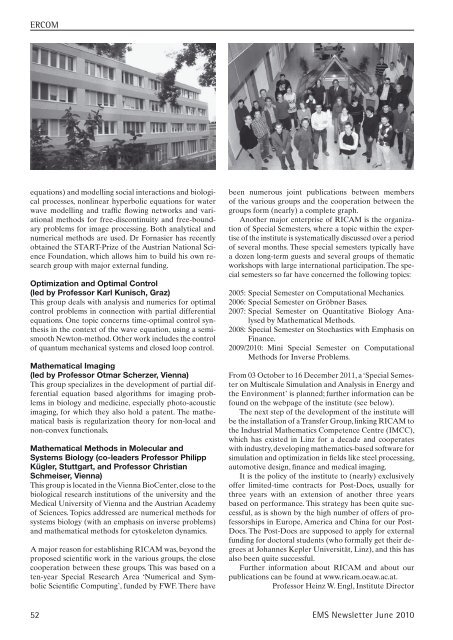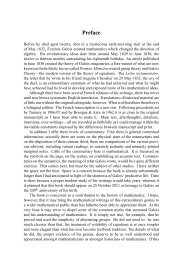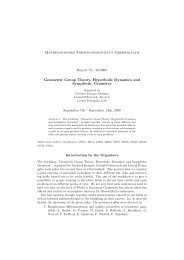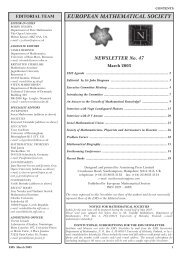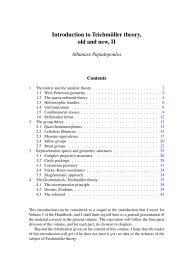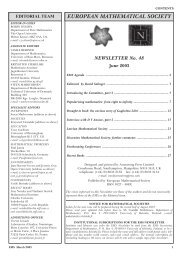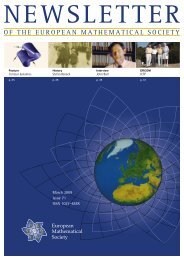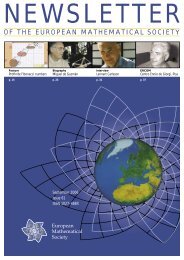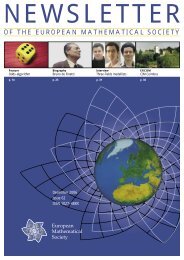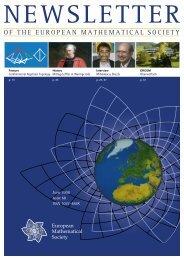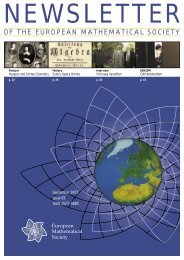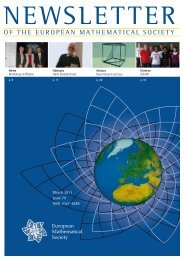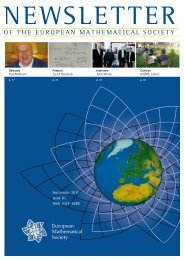EMS Newsletter June 2010 - European Mathematical Society ...
EMS Newsletter June 2010 - European Mathematical Society ...
EMS Newsletter June 2010 - European Mathematical Society ...
You also want an ePaper? Increase the reach of your titles
YUMPU automatically turns print PDFs into web optimized ePapers that Google loves.
ERCOM<br />
equations) and modelling social interactions and biological<br />
processes, nonlinear hyperbolic equations for water<br />
wave modelling and traffic flowing networks and variational<br />
methods for free-discontinuity and free-boundary<br />
problems for image processing. Both analytical and<br />
numerical methods are used. Dr Fornasier has recently<br />
obtained the START-Prize of the Austrian National Science<br />
Foundation, which allows him to build his own research<br />
group with major external funding.<br />
Optimization and Optimal Control<br />
(led by Professor Karl Kunisch, Graz)<br />
This group deals with analysis and numerics for optimal<br />
control problems in connection with partial differential<br />
equations. One topic concerns time-optimal control synthesis<br />
in the context of the wave equation, using a semismooth<br />
Newton-method. Other work includes the control<br />
of quantum mechanical systems and closed loop control.<br />
<strong>Mathematical</strong> Imaging<br />
(led by Professor Otmar Scherzer, Vienna)<br />
This group specializes in the development of partial differential<br />
equation based algorithms for imaging problems<br />
in biology and medicine, especially photo-acoustic<br />
imaging, for which they also hold a patent. The mathematical<br />
basis is regularization theory for non-local and<br />
non-convex functionals.<br />
<strong>Mathematical</strong> Methods in Molecular and<br />
Systems Biology (co-leaders Professor Philipp<br />
Kügler, Stuttgart, and Professor Christian<br />
Schmeiser, Vienna)<br />
This group is located in the Vienna BioCenter, close to the<br />
biological research institutions of the university and the<br />
Medical University of Vienna and the Austrian Academy<br />
of Sciences. Topics addressed are numerical methods for<br />
systems biology (with an emphasis on inverse problems)<br />
and mathematical methods for cytoskeleton dynamics.<br />
A major reason for establishing RICAM was, beyond the<br />
proposed scientific work in the various groups, the close<br />
cooperation between these groups. This was based on a<br />
ten-year Special Research Area ‘Numerical and Symbolic<br />
Scientific Computing’, funded by FWF. There have<br />
been numerous joint publications between members<br />
of the various groups and the cooperation between the<br />
groups form (nearly) a complete graph.<br />
Another major enterprise of RICAM is the organization<br />
of Special Semesters, where a topic within the expertise<br />
of the institute is systematically discussed over a period<br />
of several months. These special semesters typically have<br />
a dozen long-term guests and several groups of thematic<br />
workshops with large international participation. The special<br />
semesters so far have concerned the following topics:<br />
2005: Special Semester on Computational Mechanics.<br />
2006: Special Semester on Gröbner Bases.<br />
2007: Special Semester on Quantitative Biology Analysed<br />
by <strong>Mathematical</strong> Methods.<br />
2008: Special Semester on Stochastics with Emphasis on<br />
Finance.<br />
2009/<strong>2010</strong>: Mini Special Semester on Computational<br />
Methods for Inverse Problems.<br />
From 03 October to 16 December 2011, a ‘Special Semester<br />
on Multiscale Simulation and Analysis in Energy and<br />
the Environment’ is planned; further information can be<br />
found on the webpage of the institute (see below).<br />
The next step of the development of the institute will<br />
be the installation of a Transfer Group, linking RICAM to<br />
the Industrial Mathematics Competence Centre (IMCC),<br />
which has existed in Linz for a decade and cooperates<br />
with industry, developing mathematics-based software for<br />
simulation and optimization in fields like steel processing,<br />
automotive design, finance and medical imaging.<br />
It is the policy of the institute to (nearly) exclusively<br />
offer limited-time contracts for Post-Docs, usually for<br />
three years with an extension of another three years<br />
based on performance. This strategy has been quite successful,<br />
as is shown by the high number of offers of professorships<br />
in Europe, America and China for our Post-<br />
Docs. The Post-Docs are supposed to apply for external<br />
funding for doctoral students (who formally get their degrees<br />
at Johannes Kepler Universität, Linz), and this has<br />
also been quite successful.<br />
Further information about RICAM and about our<br />
publications can be found at www.ricam.oeaw.ac.at.<br />
Professor Heinz W. Engl, Institute Director<br />
52 <strong>EMS</strong> <strong>Newsletter</strong> <strong>June</strong> <strong>2010</strong>


